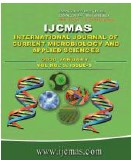


 National Academy of Agricultural Sciences (NAAS)
National Academy of Agricultural Sciences (NAAS)

|
PRINT ISSN : 2319-7692
Online ISSN : 2319-7706 Issues : 12 per year Publisher : Excellent Publishers Email : editorijcmas@gmail.com / submit@ijcmas.com Editor-in-chief: Dr.M.Prakash Index Copernicus ICV 2018: 95.39 NAAS RATING 2020: 5.38 |
A doubled haploid (DH) is a genotype developed when haploid cells undergo chromosome doubling. Artificial production of doubled haploids is important in plant breeding. Double haploid (DH) breeding can helps in speedup conventional plant breeding programmes and make early release of cultivars with superior and desirable traits along with greater utility in other research aspects of plant breeding, genetics and genetic engineering. DH’s helps in complementing back cross breeding by transferring genes of interest from wild relatives thus breaking genetic barriers. The unique complete homozygous nature of DH’s, less time requirement to produce a large number of DH’s, absence of heterozygosity, efficiency over conventional systems and absence of gametoclonal variation in DH’s make them very valuable material for very important genetic and molecular studies. So, DH’s are extensively used for genetic studies like studying inheritance of quantitative traits, Quantitative Trait Loci (QTL) mapping, Genomics, gene identification, whole genome mapping and production of stable transgenic plants.
 |
 |
 |
 |
 |